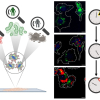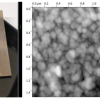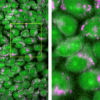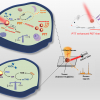
A team of chemists from the Croatian Ruđer Bošković Institute (RBI) have described a new, easy-to-use method for uninterrupted monitoring of mechanochemical reactions. These reactions are conducted in closed milling devices, so in order to monitor the reaction one has to open the reaction vessel, thus interfering with the process. The new method uses Raman spectroscopy to get deeper insight into solid-state milling reactions, without the usual interruption of the chemical reaction process.
Mechanochemical synthesis by milling is used today to prepare all classes of compounds and materials. It is a simple, fast and more environmentally friendly alternative to classical solution synthesis, that greatly reduces the use of solvents and waste generation because the reactions take place in a solid state without solvents and are driven by the input of mechanical energy. However, in order to bring mechanical energy into the system, the solids are placed in reaction vessels made of metals such as steel, as well as clear plastic. Ball mills are then added with the solids, and the mill vessels are then placed on specialised mills where they oscillate at high frequencies.
“Although mechanochemical synthesis by milling is becoming more and more popular and widespread, the way in which reactions take place in such closed reaction vessels makes it impossible for us to monitor chemical and physical processes. Namely, in the past, the chemical reaction was often monitored by stopping the milling and opening the reaction vessel, and then taking a small part of the sample from the vessel for analysis. However, stopping milling does not necessarily mean that this chemical reaction is complete, which means that monitoring chemical processes in this way does not always give good results”, explains Dr Stipe Lukin from the Croatian research team.
“Our Raman spectroscopy method uses a laser that passes through a clear plastic reaction vessel during the reaction allowing us to collect spectroscopic data. With this method we can monitor the formation and disappearance of various chemical bonds and identify the newly formed products during the reaction. In this way, we can gain deeper insights into the reaction mechanisms and find out why and how reactions take place”, explained Dr Lukin. He added that although Raman spectroscopy is an essential technique of process analytical technologies used in the chemical and biopharmaceutical industry for uninterrupted monitoring of manufacturing processes, it has not yet come close to realising its full potential.














